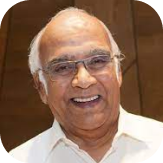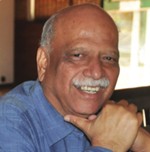
Prof Swaminathan Sivaram
Professor of Eminence, SVU & Honorary Professor Emeritus and INSA Emeritus Scientist, Indian Institute of Science Education and Research, Pune
Prof Swaminathan Sivaram is a polymer chemist by profession and a mentor as well as a science administrator of distinction. He is a former Director of the CSIR - National Chemical Laboratory, Pune (2002-10), Shanti Swarup Bhatnagar Fellow of CSIR and J C Bose Fellow of the Department of Science and technology. Currently, he is an Honorary Professor and INSA Senior Scientist of the Indian Institute of Science Education and Research (IISER), Pune. Dr Sivaram is a highly decorated scientist with numerous awards and honours to his credit. He was conferred Padma Shri by the President of India in 2006.
He is a recipient of the Gold Medal of the Chemical Research Society of India for his life-time achievements in chemistry (2019) and the International Award for distinguished contributions to polymer science, awarded by the Society of Polymer Science, Japan (2017). Dr Sivaram earned his Bachelor of Science degree in Chemistry from Madras Christian College (1965) and is a distinguished alumnus of IIT-Kanpur (MSc, 1967). He earned a PhD in Chemistry and DSc (hc) from Purdue University, W Lafayette, Indiana, USA. He is an elected Fellow of all the learned academies of science and engineering in India as well as The World Academy of Sciences, Trieste, Italy. He is a technical consultant to several reputed Indian companies and serves on the Board of Directors of many leading Indian companies dealing with chemicals and materials. He was a founder Chairman and director of Venture Centre, A Section 8 company, Pune, one of the first science driven technology business incubators established in India in 2004. Dr Sivaram's research interest concerns polymer synthesis, surface chemistry of polymers, porous polymers for energy related applications, biodegradable polymers, organic-inorganic hybrids, nano composites and structure property relationship in polymers. He has authored over two hundred and forty-five papers in peer-reviewed journals, edited two books and authored one book. He is cited as an inventor in fifty-one issued US and European patents and fifty- two Indian patents. He has supervised the doctoral thesis of about forty students and mentored over fifteen post-doctoral fellows in a research career spanning fifty years

Prof Sudip Roy
Adjunct Professor, PhD Chemistry (University of Saarland)
Prof Sudip Roy brings over 19 years of experience in research and innovation across academia and industry. His expertise spans the oil and gas (Shell R&D), pharmaceutical (Akamara Biomedicine), and semiconductor (Intel) sectors. He began his career as an academic and served as a scientist at CSIR–National Chemical Laboratory, Pune, where he led a team of PhD students and contributed to numerous industrial and government- funded projects in computational chemistry and materials science. Professor Roy is also the Co-founder of Prescience Insilico Pvt Ltd, a company focused on developing cutting-edge AI/ML-based methodologies for the design of highly selective drugs and advanced materials. He holds a PhD in Chemical Sciences from the University of Saarland, Germany, and completed his post-doctoral research at the Technical University of Darmstadt, Germany. In recognition of his leadership in research and innovation, he was awarded a Chevening Fellowship in 2019 and studied Management of Research, Science and Innovation at the University of Oxford, UK.

Prof Swapan Ray
Professor of Practice, Somaiya Vidyavihar University Mentor, “Sustainability Team” at Reliance
Prof Swapan Ray is Mentoring the Sustainability Team at Reliance since its inception 2018. He was Superannuated from Reliance Industries Limited in 2016 as Sr Executive Vice President after working in various capacities in Product Management for PP and PVC, Market and Business Development for Polymers, Corporate and Regulatory Affairs. At present He is mentoring the newly formed―Sustainability Team. He has also worked with Indian Petrochemicals Corporation Limited from 1976 – 1993 where he was managing business for PE, PP, PVC, ABS (from ABS Plastics), Engineering Plastics (from GE Plastics), Product Development, Market Development, Logistic Management, New Projects. Supporting Indian Center for Plastics in the Environment (ICPE), a not-for-profit, non-partisan, technical body supported by the industry as its Hon Secretary. He worked as past Chairman of the Governing Council of Indian Institute of Packaging, an autonomous educational institute in the field of packaging under Ministry of Textile and Commerce, Government of India. He is a Member of editorial advisory board of―Polymer Communique a trade publication of the plastic industry.

Dr A V Radhakrishnan
PhD (Raman Research Institute, Bengaluru) Post Doctoral Research: Mechanobiology Institute, Singapore & DBS, NUS Singapore (2013-2016) Associate Professor, SciSER® Physics
Experience:
CNRS-Researcher-Teacher in Physics and Biophysics position at French National Centre for Scientific Research (CNRS), France & Interdisciplinary Institute for Neuroscience, UMR 5297, University of Bordeaux France (2017-2021); Senior Scientist, Institute of Physics, Physics of Living matter, Experimental Physics I, University of Bayreuth, Bavaria, Germany (2022-2024); Academic Visitor, Raman Research Institute (2016, 2017, 2019); Full time Teaching Experience: Asst. Lecturer in Physics Department, National Institute of Technology , Surathkal, Karnataka (2004). Dr A V Radhakrishnan is a soft condensed matter physicist, working on problems in Cell and Nuclear mechanics, Mechanobiology, Rheology and Liquid crystals. He has expertise on all kinds of optical microscopy techniques, xray scattering and Modelling and super solution optics and he use these experimental tools together with theoretical modelling and phenomenological theories in solving problems of his theme of interest: structure, dynamics and function.
Dr Radhakrishnan is credited to the discovery of superlattices and novel lattices in DNA-complexes and a novel route to achieve a cascade of phase transitions in lyotropic systems (PNAS 2012). He also established the Nuclear dynamics is dictated by Cell geometry in a Seminal work done at the Mechanobiology Institute Singapore (BPJ, 2017) and he made the original discovery of reversible chromatin condensation (2013) by designing a compressive load set up at the Nuclear mechanics and Genome Regulation Laboratory, Singapore (MBoC 2018). Recently, he is invited as Scientific Consultant to some of the deep tech start ups and R&D firms.
Selection Publications:

Dr Biji Balakrishnan
PhD, Biomaterials (Sree Chitra Tirunal Institute for Medical Sciences & Technology, Kerala) Associate Professor, SciSER® Chemistry
Experience:
DST Scientist at IIT Bombay and BARC
Dr Biji focusses on developing innovative solutions for tissue engineering, wound healing, and targeted combinatorial cancer therapy, Biomaterial Modifications: Investigation of chemical modifications to improve biocompatibility. Driven by a strong commitment to advancing healthcare, her work reflects an interdisciplinary approach that bridges chemistry, biology, and materials science. She has to her credit: Edited Book- "Engineered Biomaterials: Progress and Prospects" and a book co-edited with Dr P A Hassan and Dr AK Tyagi, BARC Dr Biji Balakrishnan presenting state-of-the-art developments in biomaterials research. Her name is included in list of top 2% scientists published by Stanford University in the year 2021 & 2022.
Selection Publications:
For full list: Visit Link

Prof Soumyadeb Ghosh
PhD (Indian Institute of Science, Bengaluru) Senior Professor, Head SciSER®
Experience:
Prof Soumyadeb Ghosh has thirty years of research experience, both in industrial R&D and the academia. He has made significant contributions in a wide range of research areas of polymeric materials, such as novel composites & nano-materials, polymeric blends and copolymers, and supramolecular materials. Prof. Ghosh is motivated by the idea of implementing integrated Sciences in Education and research with his team.
Selection Publications:

Dr Tressa Jacob
PhD, Natural Science (Eberhard Karls University, Tübingen Germany) Postdoctoral Research: Max Planck Institute of Developmental Biology, Tübingen Germany Associate Professor, SciSER® Life Science
Experience:
Independent Scientist at IISER-Pune (DBT- BioCARE Principal Investigator, DST-WoS-A, DBT-Genome editing grant). Assistant Lecturer at Sophia College for Women, Mumbai. Dr Tressa’s research interest includes understanding gene functions and gene regulation underlying developmental, regeneration and neuronal processes in zebrafish. She conducts gene expression studies by using approaches like in situ hybridisation and qRT- PCR, and gene function analysis by knock-out strategy using CRISPR-Cas9.
Selection Publications:

Dr Manoj Mishra
PhD (Birla Institute of Technology, Mesra) Postdoctoral Research: Catholic University of Daegu, South Korea Associate Professor, SciSER® Physics
Experience:
Dr Manoj is a theoretical physicist specialising in nonlinear optics and plasmonic devices. His research interests lie primarily in nonlinear optics, with a focus on spatial solitons in nonlocal media, beam dynamics, and stability analysis. He has also explored aspects of plasmonic devices for sensing applications. Dr Mishra has authored over 70 publications in peer-reviewed journals and conferences. Dr Mishra has about two decades university teaching experience to his credit.
Selection Publications:

Prof Shridhar R Gadre
FNA, FASc (IIT, Kanpur) Adjunct Professor, Somaiya , Vidyavihar University.
Prof Gadre is one of the founding figures of Computational and Quantum Chemistry in India. Prof Gadre is a Honorary Distinguished Professor, and INSA Senior Scientist at Departments of Chemistry and Scientific Computing, Modelling & Simulation, Savitribai Phule Pune University
Prof Gadre's research interests include, Theoretical and Computational Quantum Chemistry, Molecular electrostatics potentials and momentum densities, Chemical reactivity and weak interactions and he has pioneered a technique called the Molecular Tailoring Approach.

Dr Anant D Kulkarni
PhD (University of Pune, India), MRSC (UK) Associate Professor (Polymer Science), and Coordinator, Centre of Excellence in Computational Science and Simulations (C2S2)
Dr Kulkarni's research interest includes computational and quantum chemistry, density functional theory, simulations for energy storage and generation, hydrogen bonded molecular clusters, organic reactions, molecules, as well as clusters in external electric field. He has extensive experience in various traditional and modern computational simulation techniques in materials science, computational chemistry, and high-performance computing.

Dr Daly Davis
PhD (Cochin University of Science and Technology, Kochi) Associate Professor in Chemistry, Department of Polymer Science
Dr Daly Davis is actively engaged in research on electron–molecule collision experiments and Raman spectroscopy. Her areas of focus include quantum chemical calculations, astrochemistry, electron-induced chemical reactions in biological and polymeric systems, and studies on DNA repair mechanisms.